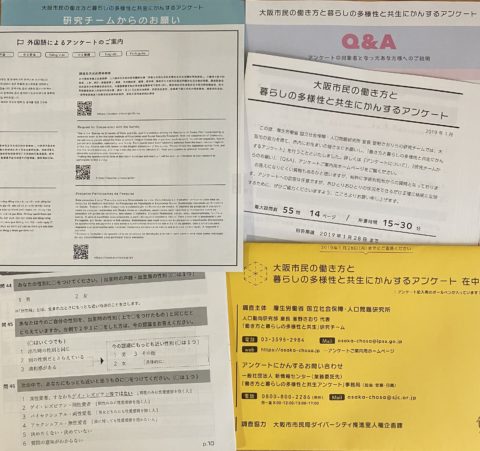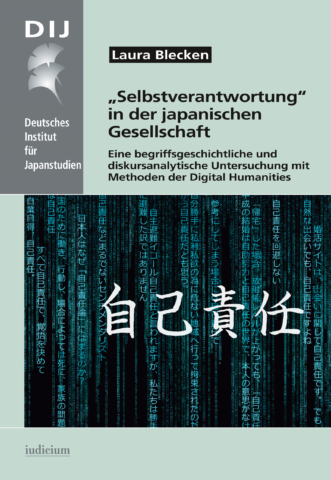Veranstaltungen und Aktivitäten
New Edited Volume on Health and Technology

The new book publication Humans and Devices in Medical Contexts. Case Studies from Japan explores the ways in which socio-technical settings in medical contexts are articulated in Japan. It consists of a detailed theory chapter and nine case studies on topics concerning: experiences with radiation in Hiroshima, Nagasaki, and Fukushima; patient security, end-of-life and high-tech medicine in hospitals; innovation and diffusion of medical technology; and the engineering and evaluating of novel devices in clinical trials. The individual chapters situate humans and devices in medical settings in their given semantic, pragmatic, institutional and historical context. A highly interdisciplinary approach offers deep insights beyond the manifold findings of each case study, thereby enriching academic discussions on socio-technical settings in medical contexts amongst affiliated disciplines. The book is edited by DIJ researcher Susanne Brucksch and Kaori Sasaki (Sapporo Medical University). Details
Next DIJ Method Talk on surveys in Japan

In recent years, issues involving sexual and gender minorities have increasingly attracted attention in Japan. Addressing the lack of data to understand social inequality based on sexual orientation and gender identity (SOGI), Daiki Hiramori and Saori Kamano developed questions to measure SOGI on population-based surveys under the research project “Demography of Sexual Orientation and Gender Identity: Building a Foundation for Research in Japan.” In their talk, they will report the results of a population-based survey and present findings from their preparatory studies and an experimental web survey. The speakers will conclude their talk by discussing two approaches to population sexuality to explore the possibility of a queer demography. Details and registration here
Speakers:
Daiki Hiramori, University of Washington, Seattle
Saori Kamano, National Institute of Population and Social Security Research, Tokyo
Keynote talk by Susanne Brucksch at Robotics Conference

DIJ Principal Researcher Susanne Brucksch will be one of four keynote speakers at the 17th IEEE International Conference on Advanced Robotics and its Social Impacts (ARSO 2021). In her keynote on Friday, July 9, Susanne will reflect on how the relationship between humans and devices in medical contexts can be specified when the sociocultural dimension of a particular locale is included. For instance, the study of the social context provides manifold insights on knowledge production, research and development processes, user contexts, and the institutional background of the making and application of medical devices. Examples from the research literature and case studies will illustrate these intersections. Her talk draws on her recently published co-edited volume Humans and Machines in Medical Contexts in Japan and her book chapter „Robotic Care Devices: Aktuelle Entwicklungen in der Pflegerobotik in Japan“ in Genese und Folgen der Pflegerobotik (in German).
Understanding ‚Self-responsibility‘ in Japan – New DIJ Monograph

Hostages in war zones, nuclear refugees from Fukushima, and workers in precarious conditions: all have been assigned personal responsibility for their situation by the Japanese word jikosekinin. The term – literally translated as “self-responsibility” – has become a keyword in contemporary Japanese society. But what does jikosekinin mean and how was the term established in the Japanese language? This study (in German) by Laura Blecken examines this multi-faceted concept by combining methods of conceptual history and discourse analysis with tools from the digital humanities. It traces the word back to its roots and creates a model for its different meanings through which various discourses converge. Finally, the study investigates how jikosekinin is used today by analyzing almost 40,000 blog posts. The latest volume in the DIJ Monographs Series examines the omnipresence of jikosekinin in everyday life and its role between traditional moral values and the impact of global neoliberalism. Details, including summaries of the book in English and Japanese, can be found here
Workshop ‚Technology & Society in Japan and Beyond‘

Technical artefacts, technologies, and infrastructures are shaping our everyday life in manifold ways. At the same time, their development, promotion and/or rejection is influenced by cultural patterns, ethical principles, social values as well as power relations. This one-day workshop of the Research Initiative ‘Technology & Society in Japan and Beyond’ brings together scholars who share an interest in the analysis of co-construction processes of technology and society in Japan and beyond. Twelve speakers will address the themes ‚User, Visions and Technology Development‘ and ‚Ethics, Health and Technology in Context‘. The workshop takes place online on June 25 and is organized by Susanne Brucksch and Cosima Wagner (FU Berlin). Details and registration here
Gender & Sexuality series lecture on women in Japanese videogames

This presentation examines the representation of women in Japanese videogames, situating the depiction of female bodies in terms of political discourse. Focusing on the online card-based wargame Kantai Collection, it analyzes how attributes of Japanese warships are reflected in the physical characteristics of women. At the same time, Kantai Collection is highly political in its theme, representation of women, and enactment of war memories. This presentation examines the game and related artefacts as part of a popular politicization of WWII by Japanese artists, also seen in the recent spate of blockbuster revisionist films, as well as Nazi imagery and narratives in anime and manga. It argues that the hyper-sexualization of women in Kantai Collection contributes to the exoticization of war as distant and unreal, in a continued context of controversial war memories in Japan. This event is part of the DIJ’s lecture series ‚Gender and Sexuality in East Asia‘. Details and registration here
Speaker:
Rachael Hutchinson, University of Delaware
Live-stream Tokyo Olympics book presentation

DIJ deputy director Barbara Holthus and our alumni Hanno Jentzsch and Florian Purkarthofer as well as Wolfram Manzenreiter (all Japanese Studies, University of Vienna) will present their chapters from Japan Through the Lens of the Tokyo Olympics at a panel discussion and book presentation on June 23. They will be joined by Georg Spitaler (Association for the History of the Workers‘ Movement, Vienna) and Corina Gallmetzer (University Library, University of Vienna). The book is an outcome of the DIJ’s special project on the Tokyo Olympics and is available for free download (open access) on the publisher’s website. The event will take place online and can be viewed via live-stream. Details and registration here
Recovery Games under the Mask – Joint JDZB & DIJ panel discussion

Olympic and Paralympic Games last on average 34 days – the preparations of the host city, however, take years. The Games have a significant impact on the cityscape, politics, society, economy, and public discourse of its host city and country. To discuss social, political, economic, and historical aspects of the Games, the Japanese-German Center Berlin (JDZB) in cooperation with the DIJ hosts a virtual book talk and panel discussion, preceded by short input statements by DIJ researchers Sonja Ganseforth, Barbara Holthus, and Torsten Weber, DIJ alumnus Axel Klein (Duisburg-Essen University), and Wolfram Manzenreiter (University of Vienna). They have all contributed to the DIJ special project on the Tokyo Olympics and are authors of the recent publication Japan Through the Lens of the Tokyo Olympics (Routledge 2020, open access). The event will be moderated by Alastair Gale, Japan Editor at The Wall Street Journal. Details and registration here





 Open Access
Open Access 
